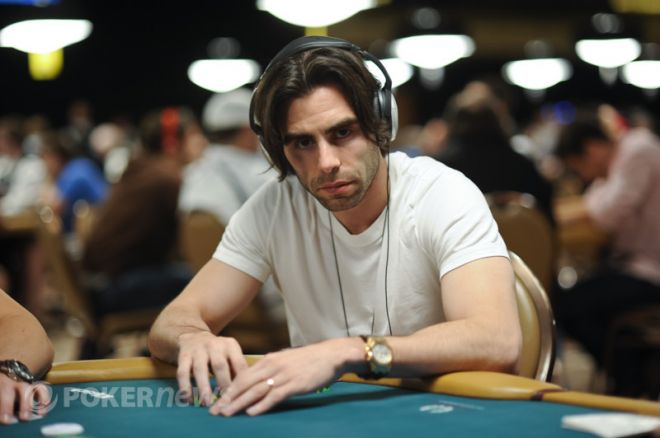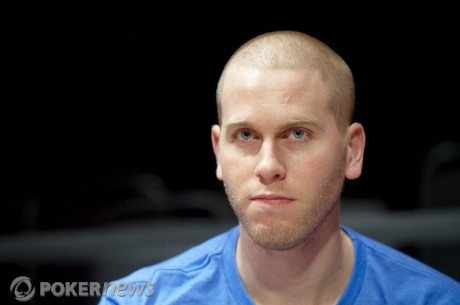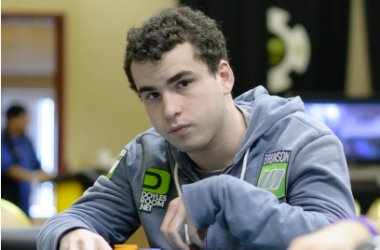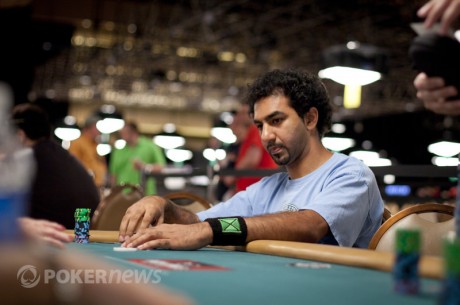A Hand from the WSOP with Olivier Busquet

This summer, Olivier Busquet, also known as "livb" online, has already cashed in three World Series of Poker events that included two deep runs in no-limit hold'em six-max events. He spoke with PokerNews about a hand he played in the $5,000 No-Limit Hold��em Six-Handed event. An event where he eventually finished 46th, good for $13,176.
Blinds: 50/100
Stacks: Olivier Busquet - 13,500; Villain �C 16,000
In the time you were at the table before this hand came up, were you able to get a good feel for the players you were facing? And what did the players at the table think of you?
Yes, I had started getting good feel for my table. My image is always pretty aggressive. I think I tend to think it��s a little bit less aggressive than other people do just because I guess I don��t realize how often I��m raising. I��d become pretty comfortable with four out of the five players at my table. I had a good sense of how I thought they were going to play, and what I wanted to do in terms of my hands.
There was one guy who was passive and tight that I could kind of run over. There was another guy I thought would try to trap me. There was another guy who seemed like he had the "I��m-not-going-to-be-bullied attitude." My opponent in this hand, though, was a fairly young aggressive kid. He was the only one I wasn��t really sure about yet. I didn��t know if he was good, or if he was a standard kind of Internet player.
When this came hand up, my original thought was that I wanted to try and get some information from him. Relatively early on, in $5,000 buy-ins and higher, I think I��m a little bit more willing to use chips to determine how I think someone is going to play, what their style is, or what type of player they are.
Preflop Action: Villain opened on the button to 250. Busquet reraised to 800 from the small blind with A?7?, and Villain called, making the pot 1,700.
So you decided to three-bet this hand to see how he'd react?
Yes. This is a hand that I kind of hate, but it��s still probably stronger than his opening range on the button. Normally I wouldn��t three-bet a hand like this versus a player that I know calls pretty often, but that was kind of the point of the three-bet. I wanted to see how he��d react to getting reraised. I wanted to see if he called quickly, if he thought about four-betting, or if he folded quickly. You can tell a lot about a player��s style and how they��re approaching hands or situations from little things that they do. This was just a probe three-bet, and I think this is a fine hand to do it with.
I was a little surprised that he called. I thought he��d call maybe 20 to 30 percent of the time. I wasn��t so excited when he called, but I didn��t really mind either because I wasn��t planning on trying to do anything crazy in the hand. I was going to bet most dry, unassuming flops and give up if I faced any resistance without a hand. On wet flops like queen-nine-eight two spades, I was just going to check and give up.
Flop Action: The flop came Ax9x6x two hearts. Both players checked.
I was out of position, and I didn��t want to build a huge pot. I basically wanted to see how he was going to play, so I decided to play my hand pretty passively.
Turn Action: The turn was the 7?. Busquet checked, and Villain bet 925. Busquet called, making the pot 3,550.
I decided to check again because I thought he would put me on a hand with some value on the flop. I thought that from his point of view, if I continuation bet on the flop, then I could have a number of hands and a number of airballs. But, when I check the flop, I think it��s more likely from his point of view that I do have something. Maybe not something super strong, but something that my intention would not be to check-fold. On the turn, I kind of want to give the sense that maybe I��m completely giving up. I also don��t want to bet and get raised because it would be a really uncomfortable spot.
It seems like he can raise light here, or raise with a hand with a lot of equity.
Yeah, he can raise light. I��m not sure he would, but again, I was just willing to play this hand passively. I was just going to check every street, which was my intention from the beginning. His bet-sizing seemed kind of small, but I thought it could be standard sizing for him. It didn��t really tell me much about his hand. I thought he��d bluff sometimes, I thought he��d bet some medium strength hands, and all his monsters. I think raising his bet is fine, but it just wasn��t part of my original plan, so I called.
River Action: The river was 7x. Busquet checked, and Villain bet 1,825. Busquet raised to 7,000, and Villain tank-called. Busquet showed sevens full of aces to win the pot of 17,550.
Why did you decide to check the river?
Keeping in line with my plan, I checked, and obviously I was raising almost any bet he made. In my point of view, I thought his bet was a bit small, but to him, I thought it was probably relatively standard to bet half the pot there. I made it 7,000 which was kind of a big raise. It was pot-sized and almost four times his bet. The reason I made it that big was because I thought it was really hard for me to represent anything.
I basically had to have aces full, or nines full which I could hardly ever have, and I didn't think he��d ever put me on that. I just thought it was really hard for me to have a believable hand. From his point of view, he probably thought I was super polarized. If I was polarized, he could call me relatively light. Also, I thought there was a decent chance that he had air or he had a big hand. If he had air, it didn��t matter how much I raised because he was folding. But, it was possible he turned a flush or a straight. A lot of times, people will check draws on the flop after someone three-bets and checks specifically because of what I said before about my hand being one that I probably intended to check-call instead of check-fold. So, if he didn��t have air, he probably had a strong hand because I didn��t think he would value bet that thinly on the river. I also thought that his range was polarized, so that's why I made the raise large.
He ended up telling me he had a straight, and I don��t have any reason not to believe him. I think his call is fine because I think he��s relatively right in the sense that my range is polarized. I��m probably not bluffing most of the time in that spot, but I��m bluffing more than most people are. It��s just not a great spot for him. If he bets more on the river, maybe it��s an easier fold when I raise.
Remember, follow us on Twitter for up-to-the-minute news.








